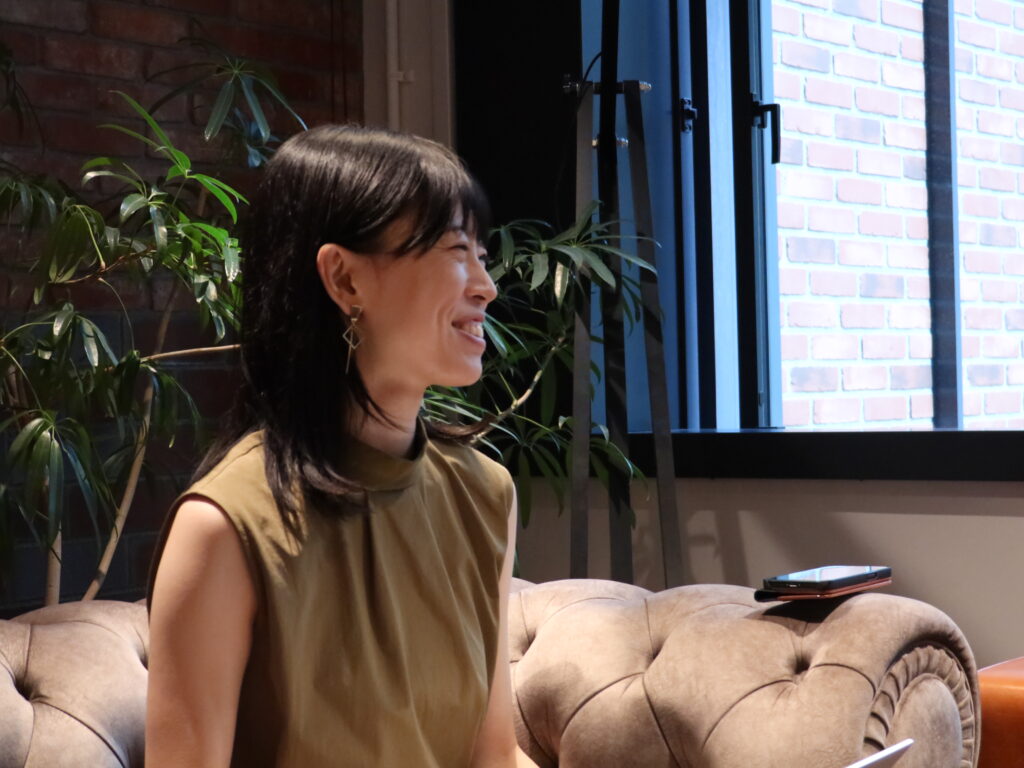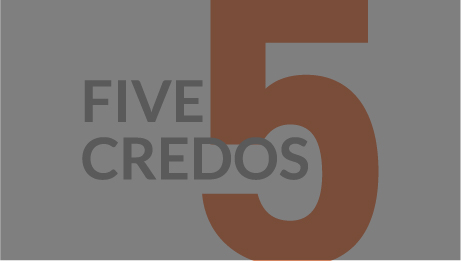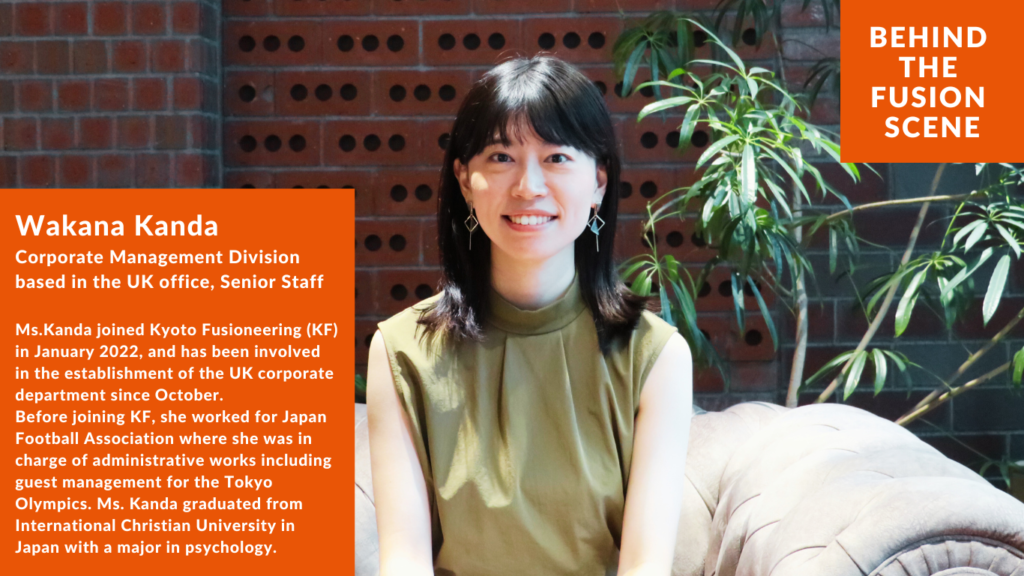
Wakana Kanda, Corporate Management Division based in the UK office, Senior Staff
Ms.Kanda joined Kyoto Fusioneering (KF) in January 2022, and has been involved in the establishment of the UK corporate department since October. Before joining KF, she worked for Japan Football Association where she was in charge of administrative works including guest management for the Tokyo Olympics. Ms. Kanda graduated from International Christian University in Japan with a major in psychology.
How did you spend your childhood?
As a curious child, I often found myself scaling great heights alone or squeezing into cramped spaces, finding adventures and exploring the world around me. On the other hand, there was another side of my childhood in which I experienced several culture shocks while defining my own identity.
Due to my father’s work, I moved frequently between Japan and other countries. I spent my childhood in Europe and returned to Japan when I was in the second grade of primary school. I particularly remember an experience in a class back then, when no one else was talking even though it was a discussion session. I honestly spoke up but then I was warned by my classmates not to express my ideas freely. It was the first culture shock in my life. I believe this experience was a turning point for me to gradually acclimate and adhere to the social norms in Japan. Just as I was becoming comfortable and embracing the Japanese environment, my father’s work required us to move to the United States.
I resided in the U.S. from fifth grade until the end of junior high school, which exposed me to a culture that was in complete contrast to my experiences in Japan. In Japan, I was accustomed to holding back my feelings, but the U.S. had a different atmosphere that valued showcasing individuality as a means of recognition. Additionally, my English proficiency wasn’t as fluent as before, which posed its own challenges. However, with my friends and teachers consistently offering positive feedback and praise for even the smallest accomplishments, I gradually gained confidence. I also had the opportunity to pursue my passion for cheerdancing, which brought me immense joy. At the very moment I was about to enter high school, my parents delivered the unexpected news of our upcoming relocation to the UK.
This was my first time rising up against my parents, however, being only 15 years old at the time, I ultimately made the decision to move with my family to the UK. Harry Potter, which I was obsessed with at that time, became my huge source of emotional support during the transition to the UK.
Although using English in the U.S. had helped me in terms of acquiring language, I spent three years in the UK fully immersed in studies since the school curriculum was comparatively advanced. On the other hand, unlike my time in the U.S., transportation by train or bus was easily accessible, allowing me to relish in British culture through extracurricular activities like visiting museums, attending opera performances, and enjoying musicals.
During this period, I also began reflecting on and confronting my own identity. To be honest, I hadn’t always held a positive view of being Japanese until that moment. However, when I was exploring assignments on my own culture, including Japanese traditional prints, ink paintings, and sculptures in an art class, I genuinely felt, “Japan is a country that could create so many beautiful things”.
Until that point, I was always feeling like an outsider wherever I visited Japan since I had never had a specific hometown. But this realisation allowed me to adopt a neutral perspective, allowing myself to be true to my own feelings in each moment, without any pressure to fit in. I understood that being from Japan didn’t mean I had to have strong emotional attachments to it, and conversely, I didn’t need to fully assimilate with the local people wherever I visited.
In particular, living in the UK, I found myself in an inclusive environment where LGBT individuals could live their lives openly, and the schools I attended were filled with a diverse mix of people from Asia, Africa, and beyond, each bringing their own unique versions of English. Within this context, I realised that I have a desire to support the person right in front of me, regardless of their background or differences in perspectives.
The opportunity to have met people from different backgrounds, genders, and nationalities throughout my journey until the age of 18 has undoubtedly been a valuable asset in my life.
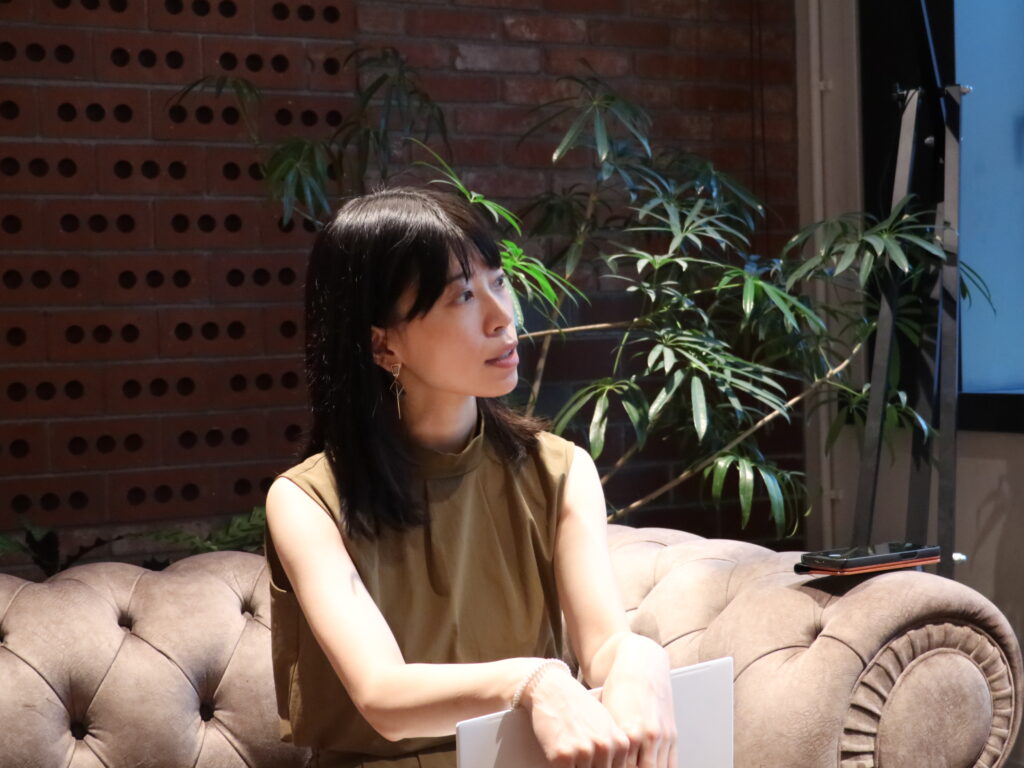
What kind of work did you do before joining KF?
After specialising in psychology at a Japanese university, I started a job as a salesperson advertising proposals for clients within Japan, particularly in the cosmetics and beauty product industry. While I found satisfaction in the work itself, I realised that I would be better suited to an environment and position that allowed me to leverage my international experiences and language skills more effectively, so I decided to look for a new opportunity.
In 2014, the World Cup was being held, so I went to Brazil to watch the matches. After returning to Japan, the job placement agency introduced me to Japan Football Association (JFA) as an organisation, factoring in my interest in sports and the desire to find a job where I could utilise my English skills.
At my assigned workplace, I was surrounded by a diverse group of members with different ages and nationalities. Not only English but also various languages such as Arabic and Italian were frequently exchanged, making it a highly stimulating environment. My responsibilities ranged from preparing for meetings with foreign football associations to creating documents, supporting the dispatch of Japanese coaches overseas, and coordinating logistics for international guests and players. Leveraging these experiences, I had the opportunity to serve as the head of guest management at Sapporo Dome during the Tokyo Olympics in 2021.
Through my experience at JFA, I realised that bringing joy and excitement to the guests was a significant source of fulfilment for me. I also discovered that I had a strong desire to contribute to the success of my respected colleagues who were dedicated to their work and it became a driving force for me to work.
What made you join Kyoto Fusioneering (KF)?
I had always been considering the idea of gaining work experience abroad. However, because my job at JFA was so fulfilling, I also thought to myself, “Unless I deliberately change my environment, I may not be able to challenge myself with something new”. Therefore, after reaching a milestone in the Olympic project, I decided to intentionally change my environment and applied to a graduate program in the UK that offered studies in hospitality management, an area I had been interested in.
However, it took nearly six months for the results of the application to come out, and I happened to come across a sales assistant position at KF while searching for a temporary position to work in whilst awaiting the result. When I was offered the opportunity to join starting from January 2022, I was thrilled.
I was mainly involved in tasks such as creating estimates, English translations, and preparing documents for grant applications. In March I was also involved in planning and organising the Kyoto University retirement party for Prof. Konishi (KF’s CTO) and I felt grateful that I was entrusted with such a big job so soon after joining the company. The event was truly an overwhelming experience for me to witness the guests coming together for Prof. Konishi. Seeing how delighted everyone was filled me with indescribable joy.
What led to your assignment in the UK?
After a few months of joining KF, I received the results from the UK graduate school application and found that I had been accepted. KF was aware of my intention to study abroad from when I joined, but when I mentioned that I also had aspirations to work overseas in the future, the company made a surprising proposal: “If you are considering working in the UK, how about working at KF’s UK branch?”.
Working at KF was fulfilling amidst the ever-changing days, and I felt incredibly fortunate to be able to support team members who possessed unique charms, both personally and professionally. Additionally, having the opportunity to meet and interact with members from the UK office during Prof. Konishi’s party further strengthened my desire to work with them in the UK. It was a moment that solidified my decision to pursue a career in the UK subsidiary.
In the UK, I was assigned to handle various administrative tasks, so from May I was taught labour, accounting, and governance duties from scratch by members of the corporate management division. I then began my assignment in the UK in October 2022.
How do you feel about the experience of working for KF UK?
In terms of work, I strongly feel the importance of having a managerial perspective. Being involved in the launch of a department, I realised the need to create guidelines and mechanisms that would enable anyone to easily handle such tasks, rather than relying on me as a substitute. I am truly grateful to the supportive supervisors who have helped me realise such insights and have dedicatedly supported me.
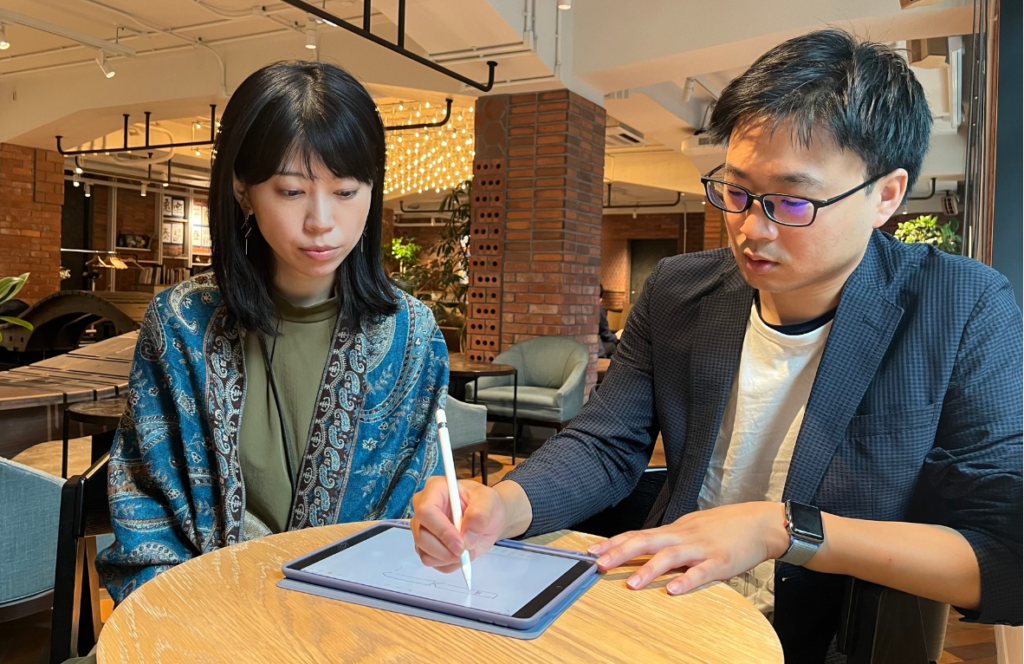
Furthermore, shortly after my relocation, an executive officer approached me and said, “While the mission of your work is important, firstly I want you to prioritise building trust with the UK team members. Due to the time difference and online constraints, I often feel that it’s challenging to fully understand the day-to-day work and the emotions of the team members in the UK from the perspective of the members in Japan. I would like you to be the bridge in that regard.” Of course, there are limits to what I can do on my own, but as someone who had experienced a sense of displacement while moving between countries in the past, I felt that I might be able to empathise and provide support.
Since then, I have made a conscious effort to communicate to the UK members that Japanese team members certainly consider the UK members as valued members, even when they are physically apart. Additionally, I strive to take actions that gradually bridge the gap between Japan and the UK that I have noticed in our daily work.
For example, when it comes to language, I noticed that information in Japan tends to be more abundant and dense, and when conveying the same content in English, there is often a tendency to simplify the finer nuances while capturing the main points. Therefore, during the initial phase of my assignment, I made an effort to attend company-wide meetings in Japan as much as possible and shared the content with the UK members during lunchtime.
Furthermore, due to the time difference, we have only about 3-4 hours of overlap in a day to interact with the Japanese team members. When I actually started communicating with the Japanese members from the UK, I realised that this time constraint makes it even more difficult to stay in touch than I initially thought. Especially considering that there are UK members who have not directly met the Japanese team members, I actively try to connect the appropriate Japanese team members as the responders when I receive questions from the UK team. I feel like I’m acting as a bit of a matchmaker.
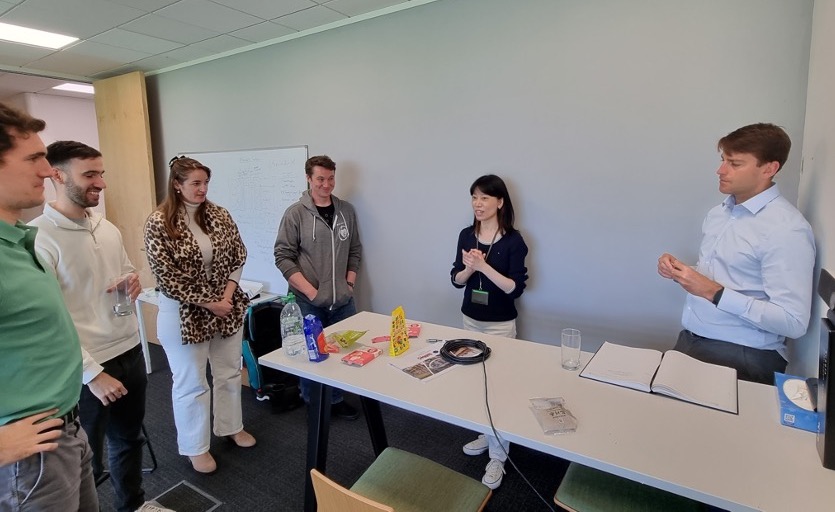
How would you envision KF as an ideal organisation?
One thing I really appreciate about KF right now is how Mr. Nagao and Prof. Konishi, the leaders of the organisation, firmly state that it’s perfectly fine for each member to have different aspirations and feelings towards the grand goal of “commercialising nuclear fusion.” I find it incredibly impressive. They often express the idea that each employee has their own life, and they want KF to be utilised to enrich those lives. Working in such an organisation makes me feel extremely fortunate.
Moreover, KF is a diverse background company, including those who have young children, those who wish to balance work with other studies, and those who are involved in roles such as temporary contracts, outsourcing, or advisory work. Since I have experienced the fear of feeling like an outsider in the past, I strongly believe in creating an organisation where every member can actively contribute in an inclusive manner.
What would you like to achieve with KF?
I would like to create an environment where the business and engineering members at the forefront of KF can fully demonstrate their capabilities and work with peace of mind. Work in the Corporate Management Division may not be a highly visible profession, but I believe it is ideal for members to be able to work on their tasks with a sense of security and without needing to consciously worry about the specifics. In order to achieve this, I am determined to develop a management perspective as I mentioned earlier.
Although I am still on the path, I am deeply grateful for the opportunity to dedicate myself to work in the current environment at KF, where I can utilise the experiences I had during my childhood and the passion I have developed from my previous job, all for the sake of the hardworking members who are pushing forward towards the industrialisation of nuclear fusion on a daily basis.
